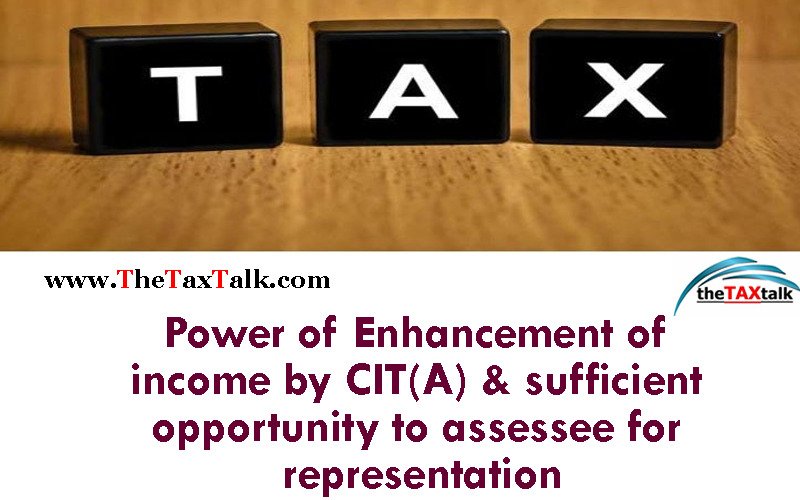![]()
Power of Enhancement of income by CIT(A) & sufficient opportunity to assessee for representation
Short Overview CIT(A) had given sufficient notice to the assessee before enhancing the assessment and that CIT(A) had also given several adjournments to the assessee for hearing of the appeals, but, assessee or his Counsel did not avail the opportunity of being heard of the appeals before him therefore, contention of the assessee had no merit that no reasonable opportunity of being heard had been given by the CIT(A).
Assessee submitted that CIT(A) has enhanced the addition under section 251(2) . The CIT(A) has not given any separate notice while enhancing the assessment and no reasonable opportunity have been given while enhancing the assessment.
It is held that The Tribunal did not agree with the submission of the assessee. The CIT(A) had specifically mentioned in the appellate order that in response to notice under section 250, Singhal, CA attended the hearing and he was heard. The CIT(A) in para-10 of the appellate order mentioned that assessee had made a request for adjournment many times which were granted and ultimately there were no compliance to the notice of hearing. Assessee was also replied about the dates of hearing fixed for hearing of the appeals in response to the request for adjournment made by the Assessee. Therefore, contention of assessee was without merit that no reasonable opportunity of being heard has been given to the assessee. In the present case, the CIT(A) has given a specific notice to assessee under section 251(2) for enhancing the assessment and such fact is mentioned in the Order Sheets, dated 5-11-2018 and 15-11-2018 as is mentioned in paras 8 and 9 of the appellate order. Therefore, when the fact of showing cause why enhancement to the assessed income be not made under section 251(2) was recorded in the Order Sheet at the appellate stage, there is no violation of section 251(2). CIT(A) had given sufficient notice to the assessee before enhancing the assessment and that CIT(A) had also given several adjournments to the Counsel for assessee for hearing of the appeals, but, the assessee or his Counsel did not avail the opportunity of being heard of the appeals before him. Therefore, contention of the assessee had no merit that no reasonable opportunity of being heard has been given by the CIT(A). This issue was, therefore, decided against the assessee and contention of Counsel for the assessee was rejected.
Decision: Against the assessee.
Income Tax Act, 1961, Section 251(2)
Appeal [CIT(A)]–New source of income–Commission income
Short Overview CIT(A) cannot consider a new source of income while making enhancement to the income of the assessee at the appellate stage while enhancing the income by CIT(A).
Assessee submitted that AO had made addition on account of commission income estimated on bank deposits in several bank accounts maintained by assessee. Assessee, therefore, submitted that CIT(A) cannot enhance the income by considering the new source, i.e., entire bank deposits as unexplained. AO asked the assessee to give names and addresses of the factory owners and the businessman and to support such statement. However, no such information has been provided by the assessee. The AO in the absence of such information should have consider the cash deposits in the bank accounts of the assessee as unexplained cash deposits in the bank accounts and should have made addition under section 69A. The AO, however, to the best reasons known to him, accepted the explanation of assessee without any supporting documentary evidences that assessee earned commission thereon. This led the CIT(A) to look into the same issue at the appellate stage while hearing the appeals of the assessee and the CIT(A) found justification to enhance the assessment by considering the unexplained cash deposits in the Bank accounts of the assessee which was also considered by the AO. Since the AO in the absence of any evidence on record did not make addition of unexplained cash deposits in the bank accounts of the assessee and even no details were filed before the CIT(A).
It is held that The CIT(A) was justified in considering the same source of income at appellate stage and was justified in making enhancement.
Notice to the assessee as to show cause as to why income should not be enhanced by making the addition on account of entire cash deposited in the Bank accounts of the assessee clearly support his findings that it was same source considered. CIT(A), cannot consider a new source of income while making enhancement to the income of the assessee at the appellate stage. Decisions relied upon by the assessee would not support the case of the assessee and were clearly distinguishable on facts.
Distinguished: CIT v. Union Tyres (1999) 40 ITR 556 (Del) : 1999 TaxPub(DT) 1435 (Del-HC) and CIT v. Sardari Lal & Co. (2001) 51 ITR 864 (Del-HC) : TaxPub(DT) 1617 (Del-HC).
Decision: Against the assessee.
IN THE ITAT, DELHI BENCH
BHAVNESH SAINI, J.M. & N. K. BILLAIYA, A.M.
Praveen Garg v. ITO
I.T.A. Nos. 1265 & 1266/Del./2019
4 March, 2021
Assessee by: Subhash Singhal, C. A.
Revenue by: Sushma Singh, Commissioner–Departmental Representative
ORDER

